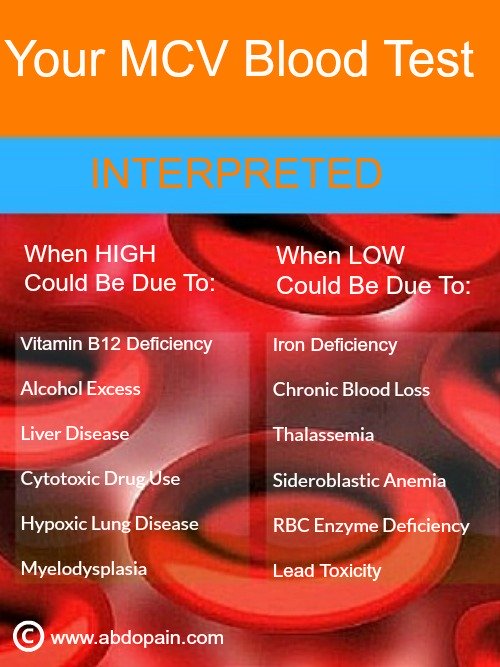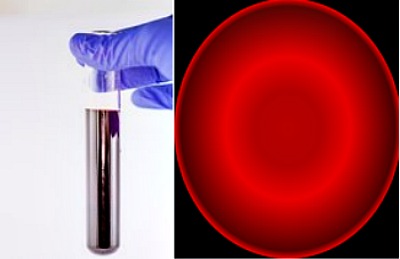MCV Blood Test
What It Means, Common Causes of Abnormal MCV, Diagnosis and Treatment
MCV blood test, also
called Mean Corpuscular Volume is a blood test done as part of the complete
blood count (CBC or FBC) test, that helps determine the average size or volume
of each of your red blood cells. MCV is also sometimes referred to as Mean Cell Volume. See what is a normal mcv level, conditions that can lead to abnormal mcv as well as how to treat abnormal levels. You would also be able to get all your mean corpuscular volume blood test result questions answered here.
Our blood contains white blood cells (WCB), red blood cells (RBC) and platelets as well as plasma, as the main components.
The red blood cells are saucer shaped and they contain the molecule called hemoglobin that helps in carrying oxygen from our lungs to the body cells where they are needed.
For
the red cells to be effective, they must be of the right volume or size. This is much
like having the right size of luggage to fit your traveling supplies and goods into; too small, you wouldn't be able to carry all you require and too large, it could cause unnecessary inconvenience as well as take too much space or even lead to damage of your luggage.
A normal red blood cell volume in an adult is about 80 -100 fL (fL is Femtoliter, the unit in which MCV is measured. It is the same as 10 raised to power minus 15 Liters or 0.0000000000000001 Liters).
This value is different in kids.
- At birth it is about 106 fL
- At 3 months of age, it is 95 fL
- At age 1, it is anywhere from 70 to 86 fL
- At 3 to 6 years of age, it is 73 – 89 fL
- 10 to 12 years of age would have an MCV of 77 to 91 fL
Though many laboratories are now able to determine an MCV directly during testing, it can be calculated from the value of the hematocrit or PCV, divided by the red cell count in a complete blood count.
What An Abnormal MCV Blood Test Means
The mcv, hemoglobin, white blood cell count, and platelet levels are the most informative components of a complete blood count.
While the hemoglobin level (Hb) in a complete blood count helps to tell if you are anemic or not, the MCV blood test goes further than this. It is very helpful in providing further information as per the type of anemia or point to problems that the hemoglobin level test alone may not indicate.
- A low MCV tells us that the volume of your red blood cells is below what is normal, a condition referred to as Microcytosis (small cells). Too small cells mean less amount of oxygen would be carried to the cells, leading to tiredness and fatigue.
- A higher than normal MCV tells us that your red blood cells are too big, a condition referred to as Macrocytosis (large cells). When the cells are too large, they could rupture easily as they squeeze pass the tiny capillaries that delivers blood to the cells of the body.
You could have a low MCV with a normal hemoglobin level as well as a low hemoglobin level and a low mcv. The
Common Causes of High MCV
The following are the more common causes of high mean cell volume in a complete blood count test:
Vitamin B12 Deficiency
- Vitamin B12 is required for proper red blood cell formation. An abnormal level of this vitamin in our diet or from depletion of our body stores that can be caused by excessive alcohol consumption would lead to high MCV.
- In vitamin B12 deficiency, the hemoglobin and iron levels in the blood test would be normal, though in some cases, the Hb (hemoglobin) could be low as well as the white blood cells and platelets.
- To diagnose a vitamin B12 deficiency, your doctor can easily request a simple blood test to measure the amount of vitamin B12 in your blood.
- If the B12 levels comes back to be below normal, you would require vitamin B12 supplements intake for about three months and have your MCV levels repeated.
- If your vitamin B12 deficiency is due to poor diet or alcohol overuse, treatment is by the use of oral tablets of vitamin B12, referred to as cyanocobalamin. A dose of 50 to 150 micro-grams taken between meals in1 - 3 divided doses is advised.
- You may need to take B12 in form of an injection - cyanocobalamin if you happen to have a deficiency of B12 due to lack of intrinsic factor. A dose of 1000mcg every month after an initial loading dose of 1000mg every week for four weeks is usually recommended.
- Within three months, it should come back to normal.
Folic Acid Deficiency
- Folic acid, also called folate, is also necessary for energy production and red blood cell formation, like vitamin B12.
- It also helps build our immune system by strengthening white blood cell production. It is required for reproduction of all cells in the body.
- Folic acid is very important in pregnancy. It helps the unborn baby develop their nervous system appropriately.
- Lack of adequate amount in our diet or from depletion by some medications like methotrexate or hydroxyurea could lead to macrocytosis or high levels of mcv.
- Again, just like vitamin B12, your doctor can request a simple blood test to measure your folate level.
- If your folic acid level is low, a replacement therapy of 5mg folic acid tablet, taken once daily for 4 months is usually enough.
Alcohol Excess
Alcohol requires high amount of vitamin b for its metabolism. So high amount of alcohol use over a long time would lead to the depletion of our natural store of vitamin B12, leading to formation of oversized red blood cells. This would then show as an abnormally high mcv blood test result.
What is an excessive amount of alcohol? Well, it actually depends to some extent on how much your body can tolerate before causing changes in your blood picture on in your liver.
As a guide, research as shown the following amount of alcohol to be within the safe limits :
- No more than 14 units of alcohol per week for a woman - that is, no more than 2 drinks per day for a woman. A drink or a unit of alcohol is 1 small glass of wine (250mls) or half pint of beer, or one small shot of spirit.
- No more than 21 units of alcohol per week, or 3 drinks per day.
Many people consume less than the above amount of alcohol and still develop a high MCV level. If your mean corpuscular volume result came back high, it is best you significantly cut down on your alcohol intake or indeed stop drinking altogether, get some vitamin B12 tablets on board and have your mcv measured in 3 to 6 months time again.
Common Causes of Low MCV
Low MCV is very common. Here are the more common reasons for low MCV.
Chronic Blood Loss
- Chronic blood loss is very common, especially in women with heavy menstrual bleed.
- Usually this is also accompanied by a low iron level in the blood
- If you are a woman with heavy periods, speak with your doctor about treatment options. Common treatment options, depending on what your medical history is or you can tolerate would include the use of combined contraceptive pills or insertion of a Mirena IUD, or endometrial ablation, or indeed hysterectomy as the very last resort in a woman who has completed their family.
- Chronic blood loss could also arise from bleeding from any part of the gut. This can arise from a bleeding stomach (or duodenal) ulcer. It can also arise from chronic blood loss from hemorrhoids (piles).
Iron Deficiency Anemia
Iron is another ingredient needed to make hemoglobin. Low iron levels in our blood could lead to the formation of small-sized red blood cells, showing up as low mcv blood test. Iron deficiency can occur from:
- Insufficient iron in diet
- Blood loss from heavy menstrual bleeding
- Bleeding for the gut - e.g from hookworm or schistosomiasis infestation, ulcers, hemorrhoids, chronic aspirin use
- Diet too rich in phosphorous
- Poor digestion and absorption
- Chronic illness
- Excessive tea and coffee consumption
- Excessive use of antacids.
The diagnosis of iron deficiency anemia is often very straightforward. If a mcv blood test result comes back low and all other parameters in the complete blood count is suggestive of low iron, a simple blood test can be ordered by your doctor to determine if you are iron deficient.
Treatment of iron deficiency is usually by means of taking iron tablets. A reasonable dose would be 100 to 200 mg of elemental iron taken on empty stomach or along with vitamin C, once, twice or three times daily, depending on the degree of iron deficiency. It is best you continue the use of iron supplement for at least three months. This is to provide the needed iron for everyday blood production and energy requirement, as well as those needed for storage in your bones and organs.
If you taking iron sulfate tablet and notice you can not tolerate it - because of constipation or "stomach pain" many patients find that switching the type of iron preparation to iron gluconate or fumarate helps them tolerate iron tablets more.
Thalassemia
- Thalassemia is an inherited condition where the body is unable to properly produce the red component of blood called hemoglobin. This arises from partial or complete failure to make globins (hemo = iron; ...globin = protein).
- There are two types of thalassemia largely: The alpha thalassemia and beta thalassemia.
- Failure to properly synthesize globin leads to production of small red blood cells, causing low mcv.
- A suspicion of thalassemia should be suspected in anyone, mainly of Mediterranean origin with a low mcv, the absence of anemia.
- Your doctor can request a blood test to diagnose thalassemia.
- Treatment is usually by bone marrow transplant in serious cases, including the avoidance of iron supplements, as this could lead to iron overload and organ damage.
Other Causes of Abnormal MCV Result Include
High MCV
- Liver disease
- Hypothyrodism - low thyroid level (myxoedema)
- Pernicious anemia (same as B12 deficiency)
- Previous weight loss surgery
- Aplastic anemia
- After Kidney Transplant
- Cytotoxic drug Use
- Hypoxic lung disease
- Myelodysplasia
Low MCV
- Celiac disease
- Poor gut absorption
- Eating disorder - anorexia nervosa, bulimia
- Drugs that impedes absorption, like metformin
- Sideroblastic anemia
- Red blood cell enzyme deficiency
- Lead toxicity and several heavy metal toxicity
References
- The Royal College of Pathologist of Australasia Manual of Use and Interpretation of Pathology Tests. Mean cell volume. http://www.rcpa.edu.au/Library/Practising-Pathology/RCPA-Manual/Items/Pathology-Tests/M/Mean-cell-volume.
- Davidson's Principles And Practice Of Medicine. 20 edition (July 1 2006). Pages 1012 to 1030.
- The British National Formulary (BNF 65), Page 615.
- Oxford Handbook of Clinical and Laboratory Investigation (3 ed.) Edited by Drew Provan. 2010. Oxford University Press. Pages 214 to 215.
Get Help With Your MCV Blood Test Questions
Did you just had your mean cell volume blood test done? What was the result like? Is there anything else you would like to know about why your MCV is perhaps abnormal? We can help. Post all your MCV questions here today and get help from our doctors on what your mcv result might mean or how to get it back to normal.
Do you have any interesting personal story or experience on an MCV test result? We would be delighted to hear from you. Please share your story here too!
It's easy. Just type your story below.
See Already Answered Questions On MCV Test Here
Click below to see questions from other visitors to this page and real answers to their query...
High MCV, Chronic fatigue syndrome - all other test are normal Not rated yet
Hello, I was diagnosed with Fibromyalgia around 5 years ago with slightly elevated ANA.
I do have Chronic fatigue syndrome as well and I'm wondering …





